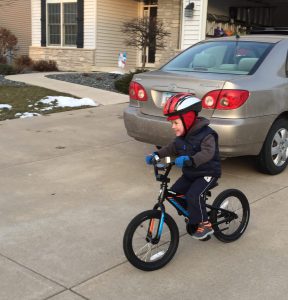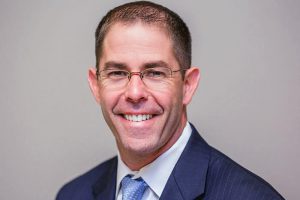By Eric Kies
Every year, my wife Laura and I try to run a half marathon in the spring and fall. In fact, running is how we met years ago. Now we have two young children, and we have reset our goals from pursuing personal best times to using our running to stay healthy and active.
Often during my long runs, my kids will ride their bikes alongside of me for at least a portion of the run. It serves as a great bonding time with them–no TV, Internet, iPhone, iPad, etc. It’s just them and me, together, with our thoughts, ideas, and conversation.
There is a relatively large hill very close to our house that a few years ago my kids named “Hugo Hill” after a street nearby. A few weeks ago as I was running up the hill, my son Kennon, who just turned five, said, “I love riding uphill dad; it makes me stronger next week!” I just smiled and with pride said, “That’s right buddy, you just keep riding up these hills.”
My mind shifted to the Global Leadership Summit I had attended two days before at our local church. John Maxwell, an internationally recognized author, speaker and expert on leadership, gave a presentation and stated, “Everything that is precious and beautiful is uphill. Significance is uphill. Leadership is uphill all the way. The problem is that people have uphill hopes and downhill habits. Until we turn on the switch of committing to going uphill, you can never change the downhill habit.”


I was introduced to Stuart Brown’s pioneering research on the importance of “play” in our lives (His book can be found on amazon.com and he also has a Ted Talk.) by my good friend Jude Boudreaux. He and I are in a study group together. At our annual retreat two years ago, Jude made a presentation on the concept of play and being intentional about play as a family. Since then, he and his family have been the subject of a feature article in the New York Times.
The dictionary defines play as a pleasurable and seemingly purposeless activity. On the surface play appears purposeless, but if you get beyond the surface it is extremely important. The reality is that it is critical for children to be exposed to different types of play to develop properly.


I think about each member of my family. What do they really enjoy? Where do they thrive? Where can we find intersections between each of us, like my bike ride with Kennon? Where do we simply need to support each other, such as my daughter Maddox’s enjoyment of theater and ballet?
Are there areas where we need to create space in our calendars—for things like running for relaxation and family time rather than racing competitively? Are we being intentional with our resources and creating the capacity for each of us to play?
As Laura and I age and our kids grow up and leave home, how will that effort evolve? Our financial planning firm does a lot of work with cash flow planning, and planning for life transitions. In that work, it has become apparent to me over the years that a family’s financial capital is simply a tool to support the other aspects of their lives.
I would invite you to think about how you play as a family, or would like to play. If you haven’t talked with your planner about how to channel your cash flow towards your most meaningful goals, please reach out to us and have that conversation.
Helping families create memories and experiences as they navigate the seasons of life is some of the most meaningful work we do as a firm. We look forward to the conversation.
Eric Kies, CFP®, is a Sr. Financial Planner in the Quad Cities office of The Planning Center, a fee-only financial planning and wealth management firm. Email him at: eric@theplanningcenter.com.



